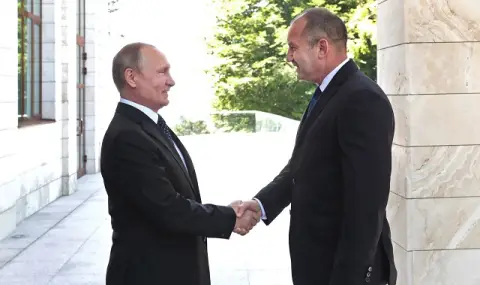Putin pressed "start" and things began to happen. And others sing to the scores of the Kremlin, but Bulgarian President Radev has surpassed them all. He is the only one who justifies in advance possible Russian strikes on NATO countries.
Since its beginning on February 24, 2024, the war in Ukraine affects all, without exception, processes in Europe: from farmers' protests to the formation (or not) of governments. When, for example, it seemed that the Ukrainians were pressuring the Russians at the front, Boyko Borisov suddenly became a Euro-Atlantic cheerleader and supported the pro-European government of Academician Denkov. When it began to appear that the Russians were pressuring the Ukrainians, Borissov terminated the existence of this government.
War goes through everything and turns everything around. But it's not just that. There is also a plan – a series of actions for various countries planned by the Kremlin. Not long ago, Putin apparently pressed “start” and things began to happen.
Reorientation in North Macedonia and Georgia
Within 24 hours, North Macedonia and Georgia slammed the door to the EU. The newly elected government in our neighbor began to spread all sorts of wild things about the renegotiation of the Prespa Treaty with Greece and relations with Bulgaria, as well as with the entire EU.
The pro-Russian government in Georgia is pushing for a law that places restrictions on all organizations – mostly media and NGOs – who, receiving funding from the EU, worked for the interests of “foreign powers”. The Georgians included the USA in this, which surpassed the Macedonians, as they slammed the door to NATO as well.
Hungarian position in NATO - "non-participation"
Shortly after this reorientation of North Macedonia and Georgia, pro-Russian spokesmen in Putin's targeted countries began to present the audience with lyrics from the same hymn sheet supporting Moscow's interests.
In Hungary, Viktor Orbán stated: “There is already a concept that has been created to describe the Hungarian position in NATO – it's called non-participation. At the moment we are not participants”. And they are not participants, according to Orban, for two main reasons. The first is that Russia will not attack Hungary as a NATO country: “NATO is a hundred, a thousand times stronger (than Russia), so it is not logical to think that Russia, which cannot even deal with Ukraine , will suddenly challenge the entire Western world”.
The second is the exact opposite of the first, namely – that if someone attacks, it will be NATO and Hungary has nothing to do with it: “How many more weapons are we going to send (to Ukraine)?... This opens up the darkest prospects. What is happening today in Brussels and Washington is a kind of mood-making in favor of direct military conflict (with Russia); we can clearly say: preparing Europe for war”.
The Russian supports, repeated by Radev
The thesis that Russia will not attack more countries, but that NATO is ready to attack Russia, was shared days later by both the Georgian rulers and the Bulgarian president. According to the Georgian oligarch Ivanishvili, the country's de facto master, there is a “world war party that exercises decisive influence over NATO and the EU and which sees Georgia and Ukraine as cannon fodder”. Prime Minister Kobakhidze accused NATO and the EU of constant, long-standing and hostile interference in Georgia's internal affairs.
The cigarette had not yet settled down after these statements – and from Switzerland (where he had fled in order not to meet in Sofia with the Secretary General of NATO or with a participant in the NATO Parliamentary Assembly) Rumen Radev joined with the same repertoire.
Radev went further than all Russian speakers
He had already explained to us that Russia was invincible and that, therefore, there was no point in continuing the war. Now explain to us – following the example of his Georgian comrades – that “all NATO member states in one way or another are involved in this war”. What's more: nobody will ask us about a future NATO war with Russia: "The hasty reactions of our politicians and institutions that Bulgaria will not send troops to Ukraine mean absolutely nothing if another NATO member country provoked a direct confrontation with Russia. There are countries that say - the Secretary General himself said it yesterday - use our long-range weapons to strike deep into Russia's rear. Russia responds - I already have the right to hit you. How do you think this can end?".
This goes beyond Orban, Ivanishvili and Kobakhidze. This is a direct reiteration of the Kremlin's mainstay: that Russia is forced to defend itself against NATO's aggressive intentions. In a certain sense, Radev goes the furthest of all the Russian spokesmen, since he is the only one who justifies in advance possible Russian strikes on NATO countries.
A carefully prepared plan
We are watching the unfolding of a plan prepared in advance by the Kremlin. Its speakers are Viktor Orban, Rumen Radev, Bidzina Ivanishvili, Irakli Kobakhidze, Gordana Silyanovska; we are about to hear the same from the likes of Vucic and co. Among the active participants are Boyko Borisov and Delyan Peevski, who are obviously working to ensure that there is never again a pro-European government in Bulgaria.
There is a plan, various bells measure its progress. Ask not, therefore, for whom these bells toll. They fight for you.
This comment expresses the personal opinion of the author and may not coincide with the positions of the Bulgarian editorial team and of DV as a whole.
